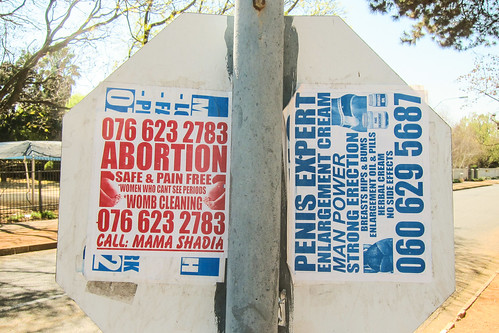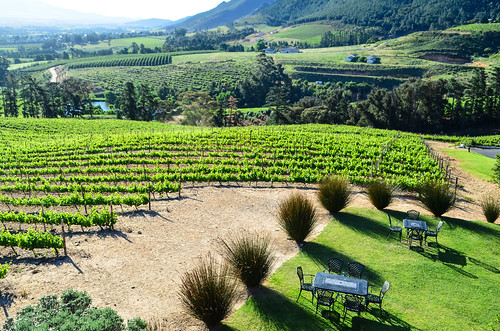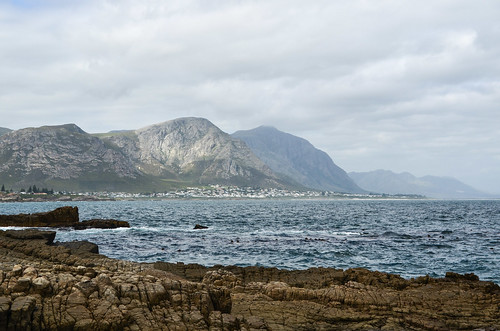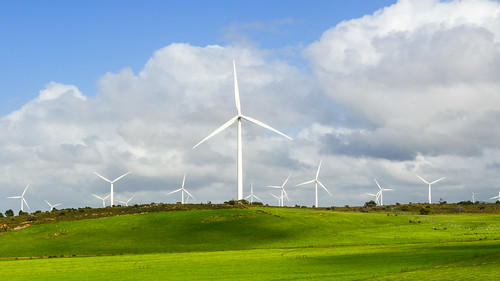The adventure is over, and this article is my attempt at summarizing 26600 KM and 666 days into one single page. One HTML page, of course.
I will illustrate it with 30 items from “you know you are a bicycle tourer when …“, a very true and funny list made by WorldOnBike that I’ve seen on Amanda’s CGOAB, that summarizes well bicycle touring far away from the comfort zone. I’m also putting photos from the surroundings of Cape Town, where I’ve spent two months of re-acclimating to “normal life”, like eating a moderate amount of food, smelling not bad, sleeping in a bed, and using the internet. Just like the ride to Good Hope, the region is very scenic.

Achievement.
I would not have bet a lot of money on my successful arrival at the bottom of Africa. Not because I don’t trust my ability to cycle and my motivation, but because this continent is really the place where anything can happen, especially on the West side, with too many parameters that one can’t control. Under-planning and over-planning can be risky.
I don’t know if it’s possible to cycle all along the Atlantic ocean without being hit by a rainy season at some point, but despite many flooded roads and rainy nights, I have not drowned. I have been very lucky with the timing, since nothing happened to me in Mauritania while the French army was fighting Islamists in neighboring Mali, I passed through Sierra Leone and Liberia before Ebola, and I cycled through Nigeria just before the country closed its borders and stopped delivering visas due to Boko Haram spreading terror. I’ve been lucky with the visas as well, because no country blocked my way: it took determination and several visits to the Embassy for the Sierra Leonean and Nigerian visas, I couldn’t enter DRC but could sail around, and I felt like being the first person to report that the Angolan visa is an easy and friendly process.
I had roughly planned 1 year and 15’000 KM for the trip. I end up with a 83% increase on time and 77% increase on distance, so let’s call it a success.

You know you are a bicycle tourer when …
1) Even when travelling by bus, you are looking around the countryside for good hidden places where you can camp without being seen
2) You walk around a city with your friends and are hand-signalling potholes and obstacles that people could trip over
3) You measure distances in days, not hours
4) You have absolutely no qualms about eating icecream, chocolate-bars, bananas, greasy chips and coca-cola for lunch
5) When you eat, you eat a lot. Really a lot

Health.
I can’t really say I got sick. I’m sure I’m healthier than before. I have many muscles everywhere a bullet-proof stomach. I have been eating everything that looks like food, even if it didn’t, and drinking water from anywhere, most of the time without purifying it, because I realized it was actually not a problem. The only time I got diarrhea, it lasted only two days, towards the end, in Angola, where I had to drink water frankly yellow (that I purified too). I visited the doctor twice: once in Senegal where I had a combo strong headache + vomit that lasted for two days (reason unknown), and once in Angola where I had painless but annoying scars on my ankles that kept bleeding for some three weeks (reason unknown, it could have been worms or larvae). I also carried an itchy ringworm with me for a long time, probably since hot springs in Morocco, and got to try at least five different creams.
Most importantly, I didn’t get malaria, even if I’ve been bitten by mosquitoes quite often. Over a long period of time, it’s not reasonable for the body (nor for the wallet, in case of malarone) to take prophylactic medication: the solution is simply to avoid mosquitoes. It’s a challenge if you’re cycling and camping in the bush, so I was taking a pill of doxycycline every 2 or 3 days, especially if I felt I had been bitten too much. I also bought a mosquito net and slept under it every time I went to a hostel (they almost never have one). I carried at all times a self-test kit and a malarone box in case of emergency. Johannes, who cycled the same route, caught malaria three times, and I know enough cycle tourers in Africa who got it. Upon my return, I was told that not taking a prophylactic pill regularly was useless, unless I have been taking it at the exact right timing. So once again, I must have been pretty lucky … We must remember that malaria kills every year between half a million to a million people around the world, with 90% of it happening in Africa. It’s 50 times more deaths than Ebola.

…
6) You never really trust local people when they tell you how far it is to the next city
7) You love to cycle mountains, except for when you actually are cycling mountains. Then you leave the mountains behind you, and you miss them again
8) You have answered the question “Where are you going?” so many times that you know the question and answer in multiple local languages
9) Your geographical knowledge about a region outshines everyone else’s, sometimes even the locals
10) You consider access to running water and electricity “a luxury”

Danger.
The biggest danger for cycling Africa is certainly the traffic. Drunk driving, overloaded driving, angry driving, “bicycles are for the poor so it doesn’t matter if I hit one” driving, speed driving, … there are many reasons not to feel safe among other vehicles. That’s why I mainly took the smallest roads, which are the most pleasant, even if sometimes they look closer to a war zone than to a road. I have 2″ tires anyway, so it’s not made to stick to the tar!
I didn’t get attacked or kidnapped, and didn’t feel it would even happen. Except maybe in Nigeria, where I have not seen any other White person and only 2 Chinese throughout the entire country’s width, I was an obvious and easy target. I have been stolen only once, and recovered the money anyway, and almost never locked my bicycle (maybe because it was always next to me, even when sleeping?). So in the end, the most helpful tool against potential danger is a side mirror, to know when is the right time to jump out of the road.
I guess it’s like everywhere, the safest roads and the most peaceful people are found away from the large cities.
Whiteness.
In case I didn’t know it, I’m White. I have been reminded of that fact almost everyday, most of the time just to draw my attention. I’d say it happened between 100 and 500 times a day for the worst days, when cycling in relatively densely populated countryside, being pointed the finger at, kids running in their neighborhoods calling their friends to come and see the White man, etc. It’s sometimes cheerful, with lots smiles, emulating a Tour de France feeling, but sometimes not, when the adults start shouting. In that case, it should not be combined with hunger!
So, I estimate I have been called/shouted at “White man” around 6000 – 10000 times during my trip, with the following local variations: toubab, doulou (Senegal), branco pelele (Guinea-Bissau), sinois, porto, foté (Guinea), apoto, pomui (Sierra Leone), kuipoo, kuiploo (Liberia), toubabo (Ivory Coast), obroni, yevu (Ghana), yovo (Benin), oyibo, oniotsha (Nigeria), sara, saraman, waman, héleblanc, ntam (Cameroon), moundele (Congo), branco, mulatto (Angola).
That’s more or less one word for one ethnic group, and it helps knowing when I’m crossing ethnic borders inside a country, for example from the Peulh to the Susu in Guinea, from the Temne to the Mende in Sierra Leone, etc. Many of them have the syllable “po” in it, rooted from the first White men ever seen there, the Portuguese. I’ve been also called (too) many times Jesus, Osama, Boko Haram, rastaman, Arab (just for having long hair and a beard), Chinese, chinaman (I was more often Chinese than White in Angola), tourist, the American, and a few times Lebanese and Zidane.

…
11) You think that a warm shower after 6 long, sweaty days of cycling is soooo good, that it was actually worth not having that shower for those 6 days.
12) You can survive days-on-end on the same monotonous canned-food or basic 3rd world local dishes
13) You know that Satan exists and that he materializes himself as a strong headwind
14) You find it a little funny when a tour-agency sells 1 hour ATV tours with big family-groups and calls it “Adventure”
15) You have filled out so many visa-applications, arrival-forms and hotel-check ins that you remember your passport number and expiration date

Writing.
I shouldn’t have started blogging with a fast pace, because I couldn’t keep up with it. Editing pictures, writing my stories and compiling videos is just taking too much time. It was doable in Europe and Morocco, where electricity is everywhere and internet fast enough, with the 3G for cheap even in the desert. But after that … it was too rare that I had electricity, and almost impossible that internet was fast enough to upload photos.
Plus, with time, I think I tended to write more carefully, so it took even longer. As a result, I “arrived” on my blog six months after my physical arrival.
Africa.
All these clichés about Africa … I’d say half is true, half is false. What’s certain is that nobody will know without visiting the place!
Apart from North and South Africa, there’s almost no tourism in the countries I’ve traveled. It’s different from the Southern and Eastern parts, that are adverstised as safariland. And it’s understandable: there’s often “nothing to see” from a tourist-guidebook perspective, the visa procedures are often unclear, and basic comfort for an average Western visitor, like reliable electricity, hot shower and cleanliness, costs at least as much as in Europe. For much less money, one can visit the more practical, more comfortable and more culturally-proud India or South-East Asia.
That’s however missing out on a unique experience. I’ve discovered plenty of things (this blog has enough pictures embedded) and have been randomly hosted a fair amount of time … If tourists visit England and Germany, there’s no reason they don’t visit Africa.

…
16) You say “hello!” to so many people everyday, that when a nearby local guy is answering his phone with “hello”, you simply reply “hello” without thinking
17) You have some seriously ugly and weird tan-lines
18) You know the definition of being seriously thirsty
19) You care an awful lot about your equipment being small and lightweight, but you have been travelling with 3 heavy books and a large, weird voodoo-talisman for the past 2 months
20) You’ve spent a ridiculous amount of time listening to music and never really get tired of it

Equipment.
There again, I have been lucky. Well, I also invested in the right kind of gear before leaving, and I did my regular maintenance almost to a point where my bicycle received no less cleaning than me. Over 26600 KM, I broke 9 spokes (always rear wheel), had 13 punctures, 1 pedal broken, and 1 bit of the frame broken. I used 4 chains and 4 sets of tires (including 1 pair of wrong quality, so only 3 were needed). And 1 full passport.
Regarding the rest of my gear: camera, batteries, phone, clothes, camping and cooking gear, everything was more or less worn out or broken by the end of the trip. And if it costs me time to repair it on the road, it also brought me more self-confidence: in the beginning, I was always stressed about what to do when something breaks. Breaking something “high-tech” in the middle of Africa has only two outcomes: you repair it yourself, or you get a new one shipped in. When it eventually happened, I had to repair it or to deal with something not functioning as expected. I thus lost the fear of the “deadline” of the first time each thing will break. When the deadlines disappeared, I was confident I could go on forever.

…
21) You often wake up with rural local 3rd world people outside your tent, who simply can’t get their head around why a foreigner is sleeping in their rice-field
22) You keep fairly well track of the phases of the moon, you know quite precisely what time the sun is setting and can easily locate the North Star
23) You think that riding an unloaded bicycle without baggage feels weird and very unstable
24) You are frustrated with map-makers and seriously don’t understand why the f*** they don’t take their job seriously
25) You are not afraid of the dark; instead, you take comfort in its ability to hide you

Experience.
Traveling on a bicycle takes much more time, but it’s also much more rewarding. I learnt a lot about African geography. I don’t remember much having studied about Africa in geography and history classes at school, I remember more about Japan and Russia for example. It’s kind of paradoxical, since Africa has much more history in common with Western Europe than those two countries.
So yes, now I know exactly what the borders in West Africa look like, where are the border posts located, I can tell what does the turnoff from Nkambe to Lake Nyos look like, which parts of Liberia are best avoided after heavy rain, where to sleep sheltered from the wind in the Sahara, which roads are tarred, which ones are scenic, etc. I also learnt a bit of the history for each place I visited, which ethnic groups populate which country, I know what is the most eaten food, I know that I can find drinking water almost anywhere, etc.
I hope I will remember, just like I remember where are the best free shizen rotenburos in Hokkaido.

…
26) You consider a trash-dump or a cemetery a perfectly fine place to spend the night
27) You are sometimes the first foreigner that the local people have ever seen in real life, and you are fine with them pulling your hair and skin to see if you are actually a real human-being
28) You are very accustomed to being stared at, and understand how monkeys in a zoo must feel. And realize that with some nationalities, you simply can not win in a staring contest (who said Indians?)
29) You have developed an unbelievable intense evil gaze that can make most of the attacking dogs turn around. And are up for a sprint when it doesn’t work…
30) You learn a lot about the local fauna from the many roadkills you see everyday

Money.
I wrote another post dedicated to budget, breaking down my costs. Cycle touring is as cheap as one wants to make it. Visas are not.
Freedom.
Some days, my life seemed quite predictable: cycle until sunset, eat twice my normal amount of food, remove the smelliest socks ever, sleep 10 to 12 hours. My body was like a machine, like a car: put food in it and it will drive off. Even these days were pleasant.
I really got used to the very little I was carrying and really needed nothing more. If something broke, I was ready to just patch it and continue, so in the end, I would not need anything. I was very light and “sustainable”!
The best feeling is the worriless ability to just ride anywhere and see something new every day. Once I had a visa sorted out for the next few weeks, I could just get up and ride the days I wanted, to the destinations I wanted, and sleep anywhere (usual precautions apply) I wanted. Having my own food, stove, tent, and vehicle under my butt, and needing nothing more, with the possibility to make plans and change them anytime, is a good definition of freedom.
In countries least densely populated, like Gabon and Namibia, securing enough food and water can be a significant concern for a cyclist. The experience is still worth the trouble.







Your blog is one of the best JB! All the details and thoughts you put into your text makes it stand above the rest. Thanks for sharing your adventures and putting so much time into doing it!
Food , equipment,roads, malaria,weather, geography, fitness,etc,etc…..
Lots of info,congrats for the adventure, hardcore,I’m a cyclist.
Lots of facts.
Really so little to say about African people who( with your legs) made this trip possible and at the end safe?
Ungrateful.
Olivier
I just recently came across your videos on YouTube and binge watched them all. What an amazing trip and you edited the videos so well. I enjoyed reading this blog as well, very well written. Thank you very much for sharing this experience of yours. I look forward to following you on your future adventures. Cheers!